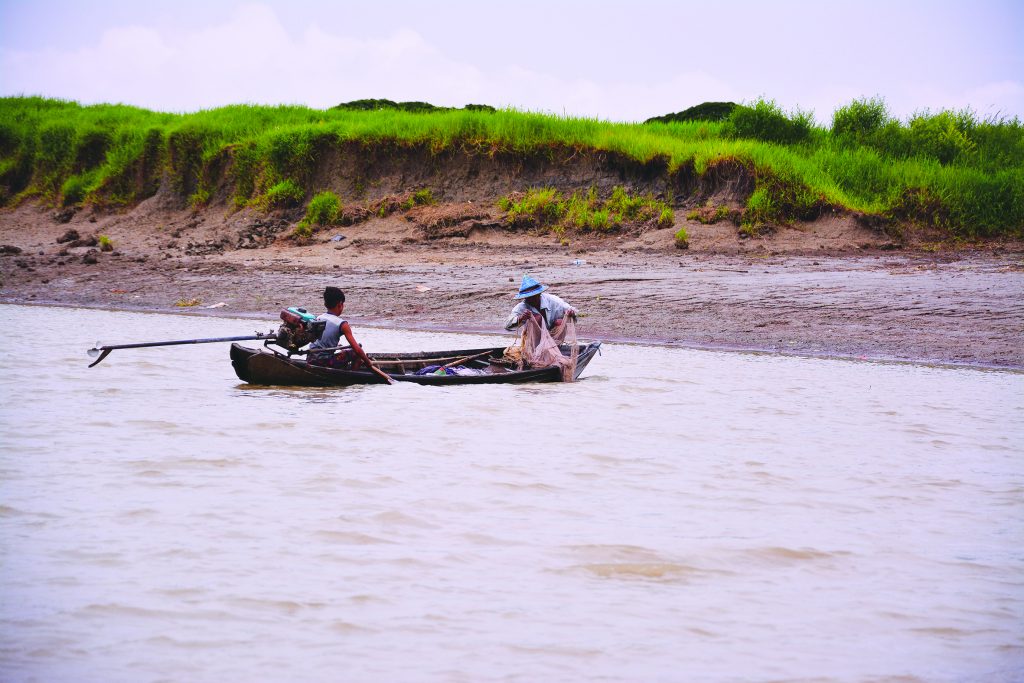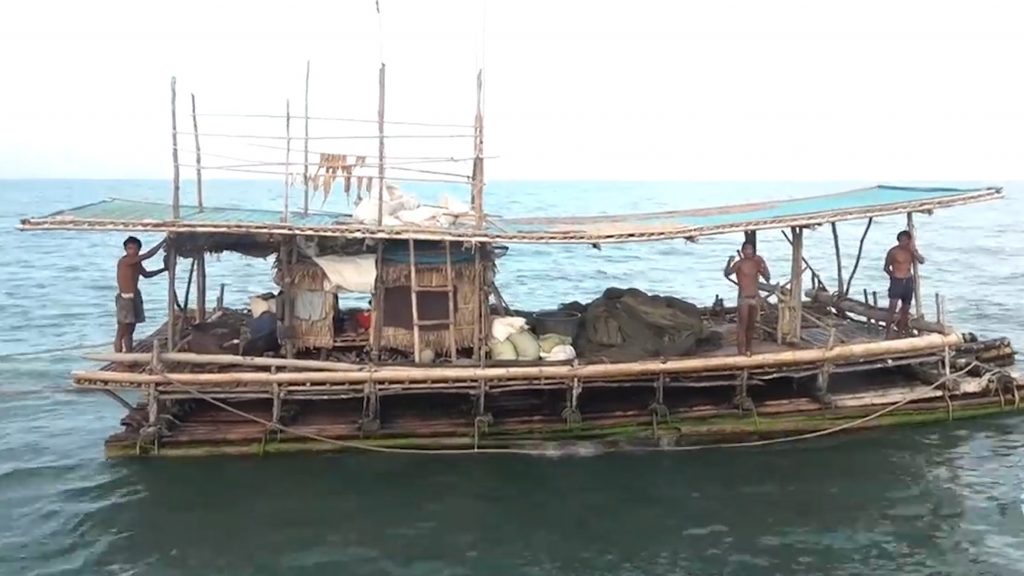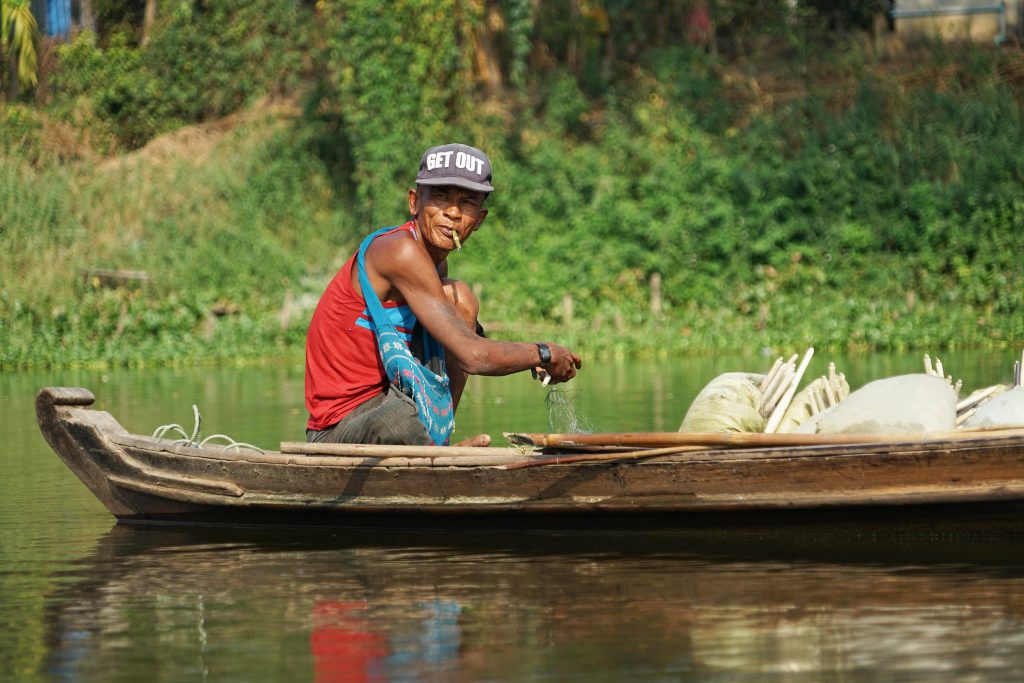Political turmoil following a military coup has robbed small-scale fisherfolk in Myanmar of their decade-long success in making democracy work for them
This article is by Kyle Nyana
The governance of Myanmar’s inland and coastal fisheries underwent reforms in favour of small-scale fisheries (SSF) and fishing communities in the period between 2010 and 2020. This happened through the promulgation of supportive laws, regulations and policies. Institutional mechanisms recognized the importance of SSF in the development of communities and in poverty reduction.
In line with the 2008 Constitution, management of freshwater fisheries and legislative power over them were decentralized to the sub-national levels of government. This resulted in significant changes in freshwater fisheries governance in several states and regions. There is a wider recognition of the SSF associations and community-based management. A 2015 amendment to the Constitution added coastal fisheries governance to the list of decentralized government services.
Between 2014 and 2018, the coastal states and regions, including Ayeyarwaddy, Rakhine, Bago and Mon, all enacted fisheries laws that included a dedicated section on community-based fisheries, giving legal recognition to small-scale fisheries and fisher organizations.
The momentum created to reform state and regional fisheries governance, in turn, accelerated the reform of the central marine fishery and aquaculture laws. By 2020, the draft marine fishery and aquaculture laws had departed from the framework of previous laws; they now included community co-management and the ecosystem-based approach to fisheries and aquaculture.
The momentum created to reform state and regional fisheries governance, in turn, accelerated the reform of the central marine fishery and aquaculture laws
This positive course changed direction radically following the military coup of 1 February 2021. Local administrations have become dysfunctional, and there is now a polarization of views along political lines. This has undermined the community-based resource management mechanism. On 7 September 2021, the military-controlled State Administration Council (SAC) announced the abolition of community-based fisheries in the Ayeyarwaddy region. It removed Chapter 8 of the Ayeyarwaddy Region Fishery Law, 2018, which dealt with community fisheries. Following this announcement, fishing lots in Ayeyarwaddy were quickly sold through the older system of auctions that have historically favoured rural elites and cronies.
There are two types of fishery licences: one for lakes, ponds, and floodplain areas, and another for the use of fence nets and stow nets in demarcated areas in rivers. To date, more than 80 per cent of Ayeyarwaddy’s community fisheries, accessed and managed by SSF associations and groups, have lost their tenure rights.

Telephone interviews with key village informants in October 2021 unveiled several theories for this policy change. One blamed it on the authorities reverting to the pre-democratic policies that focused on increasing revenue from natural resources, including fisheries. This led to a cascading effect: people have protested by not paying electricity bills and municipal taxes, and by boycotting products from companies related to the military. This has resulted in declining income from tax collections for the de facto authorities after the coup.
Power and pelf
Other survey respondents mentioned that the Ayeyarwaddy fisheries law was amended in September 2021 with the support of private-sector fish collectors and large-scale operators, called inn thar gyi, in collaboration with the Department of Fisheries. It is reported that large-scale operators and traders have bought this year’s fishing rights at a high price, even though half of the production season has already passed. In some areas, the inn thar gyi paid twice or thrice the annual price paid by SSF associations.
An SSF leader of Ayeyarwaddy gave an example: a leased fishery under community-based co-management paid Myanmar Kyat (MMK) 1.7 mn or US$960) to the government last year. This year, the same fishing ground was auctioned halfway through the fishing season; the winning bid was over MMK 8 mn (US$4,500), more than four times the cost of the previous lease. The inn thar gyi are willing to pay such a high price for only half a season because, it is suspected, they expect to get a longer-term lease at a preferential rate in the future.
It is reported that large-scale operators and traders have bought this year’s fishing rights at a high price, even though half of the production season has already passed
Prior to 2012, fishery tenure rights depended on influential players—those within the communities with the power to control fishery market chains. Once an inn thar gyihad control over tenure and access rights, small-scale fishers looking to continue fishing had no choice but to purchase an informal sub-licence created by the influential operator. These sub-licences were commonly paid for in kind; the SSF had to sell the catch to the inn thar gyiat a rate below its market value. The large-scale fishing operators and traders dominated access to fishery, value chains and market terms through such means, to the great disadvantage of SSF.
The interviewed SSF leaders confirmed that community-based co-management had reduced the strength of the bonded fishery value chain, even if it did not replace it entirely. Communities gained direct access to the fishing grounds through co-management, with reasonable and transparent taxation. With these access rights came the power to bargain for better market prices and terms. The leaders hold the view that SSF associations created a collective bargaining power for fishing communities. Further, security of tenure and access rights influenced the legal reform process.
The inconvenience of democracy
The cancellation of the legal basis for community rights in Ayeyarwaddy has angered the SSF. “The Department of Fisheries and the inn thar gyinever liked the emergence of SSF associations and community-based fisheries co-management. They always felt that SSF associations were challenging their power. And so now they have taken advantage of the political chaos to change the regulations, and are attempting to eliminate the SSF associations,” said an SSF leader.

Without tenure rights and a functioning community resource co-management mechanism, SSF organizations in Ayeyarwaddy will no longer be able to get the support of the communities from which they were formed. The reforms of the 2010s were shaped largely by emerging SSF associations, supported by non-governmental organizations (NGOs) and civil society organizations (CSOs) that actively lobbied for change. Without a strong network of SSF associations, it will be impossible to reshape fishery governance in the same way again.
Political polarization at the community level is also limiting SSF association engagement with their communities. The SSF associations related closely with the ousted government need to be careful in any community engagement or mobilization efforts; there is the risk of their leaders getting detained—or worse. In contrast, the associations close to the new authorities may have managed to retain their access rights; but the wider community and other SSF associations might not trust them any longer.
SSF leaders in Rakhine, Bago and Mon are watching the situation in Ayeyarwaddy closely, concerned that the changes might intrude into their state or region. Rakhine leaders are hopeful. Given how critical fisheries is to Rakhine, and the large number of people dependent on the sector, the SAC may not push through legislative changes favouring businessmen—at least not until they have full control over other parts of the country. Given that Rakhine has recognized numerous traditional fishery norms and practices, the leaders believe that it may not be so easy to push through the changes as in Ayeyarwaddy.
Political churn, economic downturn
The changes in fisheries governance come at a time when SSF communities across the country are reporting reduced incomes due to the COVID-19 pandemic and political unrest. Since early 2020, the fisheries value chain has stagnated due to limited demand from export markets and the closure of border trade. Business is further constrained by limitations on money transfers and cash withdrawals after the coup. Advance payments and credit along the value chain have declined since the coup; most microfinance institutions have stopped new loans for fishing communities.
As a result, the value chain is severely disrupted, with higher logistical costs, especially for fuel prices, and travel restrictions and informal payment collections at checkpoints. SSF communities are getting lower market prices or poorer terms, which impacts incomes and livelihoods. Petty crime is said to be increasing and may be a consequence of unemployment or hardship. In Ayeyarwaddy, it is believed that the loss of fishing rights or reduced access will drive many SSFs to opt for other livelihoods or migrate due to distress.
Around Yangon city, most industries are still operating, including fish-processing plants. However, improved labour standards, including maximum working hours, minimum wages, and work-safety measures, negotiated over the previous 10 years, are being discarded. The breakdown of the rule of law and an excess labour supply are providing opportunities for some private-sector businesses to neglect labour standards. Labour unions are no longer functioning in the absence of many of their leaders; some have been arrested, whie others have gone into hiding.
The excess labour supply has hit the raft fisheries in Ayeyarwaddy and Mon states. This sub-sector is notorious for labour exploitation, lack of safety measures, confinement of workers and their isolation at sea. It is reported that the basic salary for the raft workers remains unchanged at about MMK50,000 (US$29) per month. The bonus on fish catches, however, has been reduced by 50 per cent. In the current context, the raft owner associations have set new payment rates and standards; the political chaos has freed them to exploit the workforce.

Shrinking incomes and livelihood hardships for SSF families are also affecting the social development and education of children. Many respondents noted that the school dropout rate is very likely to increase in the future, especially among SSF communities. The recent changes in fishery governance in Ayeyarwaddy are undermining SSF communities as they struggle through this double crisis. In the coming months, many are expected to face food shortages. Therefore, humanitarian response and fisheries projects may soon need to address the issue of food security in SSF communities.
Short shrift, shortchanged
The hard-fought gains in SSF rights over the past decade are disintegrating quickly and quietly in the Ayeyarwaddy state. The pattern may well get repeated soon in other states and regions. These changes signal a portentous return to the old system of allocating fishing grounds to influential persons, with the SSF seen merely as cheap and exploitable labour.
For the time being, there is not much to do to prevent this deterioration. As and when external projects restart at the community level, they should do their best to protect and resuscitate community organizations supporting SSF fishers. Development programmes and projects in the future will need a high degree of adaptability to re-engage SSF communities. A flexible engagement will bring the best outcomes for SSF communities, addressing not only the immediate problems like food insecurity but also contributing to the sustainability of SSF organizations. This will retain the scope for re-shaping fisheries governance along democratic lines.
Even in 2018, the contradictory roles and responsibilities of Myanmar’s Department of Fisheries, tasked with revenue collection from fisheries concessions as well as providing support and service to fisheries stakeholders, were a cause for worry. At the time, it was evident that the success of the community co-management experiment would determine the long-term fate of Ayeyarwaddy’s small-scale fishers. Policy changes since February 2021 suggest that this experiment has unravelled, and revenue collection is now the more important role of the Fisheries Department. Despite the significant gains SSF have made in organizing themselves to participate effectively in fisheries co-management over the past decade, their fate has been snatched away from their hands. For the time being at least, they have lost agency.
For more
Confusion, Uncertainty
The Tiger’s Mouth
Labour conditions in Myanmar’s Kyar Phoung fishery
http://toobigtoignore.net/wp-content/uploads/2020/07/Yin-Nyein-et-al_Blue-Justice_final.pdf